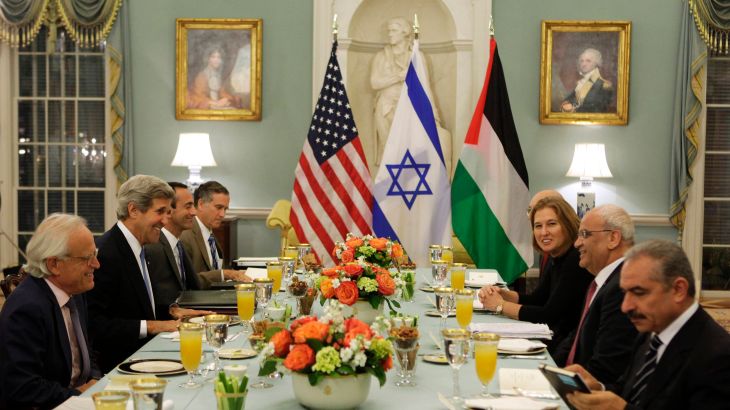
Israeli-Palestinian talks: A road to peace?
As the US has coaxed the two sides back to the negotiating table, we ask whether there is hope for a final solution.
Israeli-Palestinian talks have resumed in Washington following years of stalemate. Determined diplomacy by US Secretary of State John Kerry has coaxed the two sides back to the negotiating table.
The face-to-face meetings are the first in three years.
One can only welcome the resumption of the negotiations, because in the end the only way to resolve this conflict is through an agreement. One way or another you are going to end up with the sides agreeing to some sort of neutral acceptable arrangement. And given how far apart the sides have become, both before, and certainly since 2010, it was always going to look like this … without any real expectation of any immediate breakthrough.
The Israeli-Palestinian conflict has defied resolution for six decades, and resisted 20 years of US efforts to broker a solution.
After six trips to the region in four months, Kerry said both sides had now agreed to begin talking about “the basis for resuming final status negotiations.”
Teams were meeting on Monday and Tuesday to develop a work plan on how to proceed in the coming months.
Israel is being represented by Justice Minister Tzipi Livni and negotiator Yitzhak Molcho, while the Palestinians have chief negotiator Saeb Erekat and senior official Mohammad Shtayyeh.
The last round of direct talks broke down in 2010 over the issue of Israeli settlements in the occupied West Bank.
The history of Middle East peace talks reads like a chronicle of failure. There was great hope with a peace deal at Camp David in 1978.
Then, over 20 years later in the last days of his presidency, Bill Clinton tried to push through a final status agreement between Israelis and Palestinians. The negotiations became known as Camp David Two.
But after two weeks of intense talks between Yasser Arafat and Ehud Barak discussions collapsed over the core issues of refugees and Jerusalem.
Three years later, President George Bush announced what he called a roadmap that proposed a series of agreements leading up to a final settlement. It failed.
In 2005, the Palestinian and Israeli leaders met at Sharm el-Sheikh in Egypt but came away with only an agreement for a mutual ceasefire.
Two years later, the US hosted yet another attempt at restarting negotiations in Annapolis, but failed.
And most recently President Barack Obama brought leaders together for direct talks at the White House.
But they collapsed after Israel refused to extend a freeze on the construction of settlements.
So can US-led diplomacy lead to meaningful discussion? And is there any hope at all for a final solution?
Inside Story, with presenter Mike Hanna, is joined by guests: Daniel Levy, the director of the Middle East and North Africa Programme at the European Council on Foreign Relations; Hussein Ibish, a senior fellow at the American Task Force on Palestine; and journalist and author Ben White.
|
“On the Palestinian side you have a Palestinian president who doesn’t have an alternative strategy, so I don’t think we are missing a chance for the Palestinians to really do something different by being in these talks, and other efforts in Palestinian civil society need more time. On the Israeli side, Prime Minister Netanyahu has grown rather comfortable being able to blame the Palestinians for the absence of talks, so this is not going to create a massive pressure, but be a little out of his comfort zone possibly of Prime Minister Netanyahu.” |